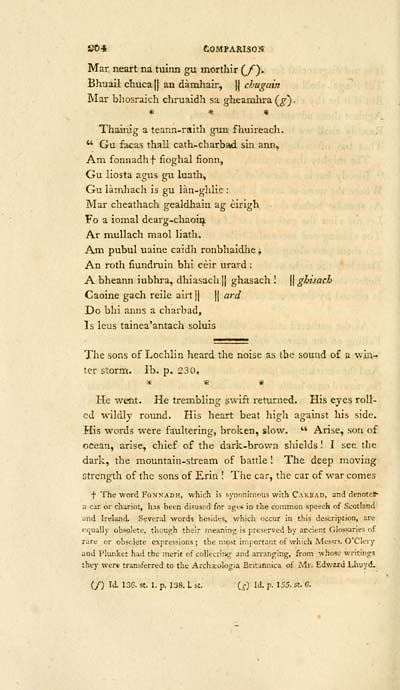Ossian Collection > Report of the Committee of the Highland Society of Scotland, appointed to inquire into the nature and authenticity of the poems of Ossian
(378)
Download files
Complete book:
Individual page:
Thumbnail gallery: Grid view | List view

204 comparison
Mar neart na tuinn gu morthir (/").
Bhuail chuca |f an dàmhair, || chugain
Mar bhosraich chruaidh sa ghearahra (^),
* * *
Thaiiiig a teann-raith gun fhuireach.
44 Gu facas thall cath-charbad sin ann,
Am fonnadhf fioghal fionn,
Gu liosta agus gu luath,
Gu làmhach is gu làn-ghlic :
Mar cheathach gealdhain ag èirigh
Fo a iomal dearg-chaoia
Ar mullach maol liath.
Am pubul uaine caidh ronbhaidhe ;
An roth fiundruin bhi cèir urard :
A bheann iubhra, dhiasach || ghasach ! || ghisaeh
Caoine gach reile airt j| || ard
Do bhi anns a charbad,
Is leus tainea'antach soluis
The sons of Lochlin heard the noise as the sound of a win-
ter storm. lb. p. 230,
* * *
He went. He trembling swift returned. His eyes roll-
ed wildly round. His heart beat high against his side.
His words were faultering, broken, slow. " Arise, sou of
ocean, arise, chief of the dark-brown shields ! I see the
dark, the mountain-stream of battle ! The deep moving
strength of the sons of Erin ! The car, the car of war comes
f The word Fonnadh, which is synonimous with Carbad, and denoted
a car or chariot, has been disused for ages in the common speech of Scotland
and Ireland. Several words besides, which occur in this description, are
equally obsolete, though their meaning is preserved by ancient Glossaries of
rare or obsolete expressions; the most important of which Messrs. O'Clery
and Plunket had the merit of collecting and arranging, from whose writings
they were transferred to the Archseologia Bntannica of Mr. Edward Lhuyd.
(/) Id. 13G. st. I. p. 138. L st. ( s ) Id. p. 155. st. 6.
Mar neart na tuinn gu morthir (/").
Bhuail chuca |f an dàmhair, || chugain
Mar bhosraich chruaidh sa ghearahra (^),
* * *
Thaiiiig a teann-raith gun fhuireach.
44 Gu facas thall cath-charbad sin ann,
Am fonnadhf fioghal fionn,
Gu liosta agus gu luath,
Gu làmhach is gu làn-ghlic :
Mar cheathach gealdhain ag èirigh
Fo a iomal dearg-chaoia
Ar mullach maol liath.
Am pubul uaine caidh ronbhaidhe ;
An roth fiundruin bhi cèir urard :
A bheann iubhra, dhiasach || ghasach ! || ghisaeh
Caoine gach reile airt j| || ard
Do bhi anns a charbad,
Is leus tainea'antach soluis
The sons of Lochlin heard the noise as the sound of a win-
ter storm. lb. p. 230,
* * *
He went. He trembling swift returned. His eyes roll-
ed wildly round. His heart beat high against his side.
His words were faultering, broken, slow. " Arise, sou of
ocean, arise, chief of the dark-brown shields ! I see the
dark, the mountain-stream of battle ! The deep moving
strength of the sons of Erin ! The car, the car of war comes
f The word Fonnadh, which is synonimous with Carbad, and denoted
a car or chariot, has been disused for ages in the common speech of Scotland
and Ireland. Several words besides, which occur in this description, are
equally obsolete, though their meaning is preserved by ancient Glossaries of
rare or obsolete expressions; the most important of which Messrs. O'Clery
and Plunket had the merit of collecting and arranging, from whose writings
they were transferred to the Archseologia Bntannica of Mr. Edward Lhuyd.
(/) Id. 13G. st. I. p. 138. L st. ( s ) Id. p. 155. st. 6.
Set display mode to: Large image | Transcription
Images and transcriptions on this page, including medium image downloads, may be used under the Creative Commons Attribution 4.0 International Licence unless otherwise stated. ![]()
| Permanent URL | https://digital.nls.uk/81753274 |
|---|
| Description | Selected books from the Ossian Collection of 327 volumes, originally assembled by J. Norman Methven of Perth. Different editions and translations of James MacPherson's epic poem 'Ossian', some with a map of the 'Kingdom of Connor'. Also secondary material relating to Ossianic poetry and the Ossian controversy. |
|---|
| Description | Selected items from five 'Special and Named Printed Collections'. Includes books in Gaelic and other Celtic languages, works about the Gaels, their languages, literature, culture and history. |
|---|

